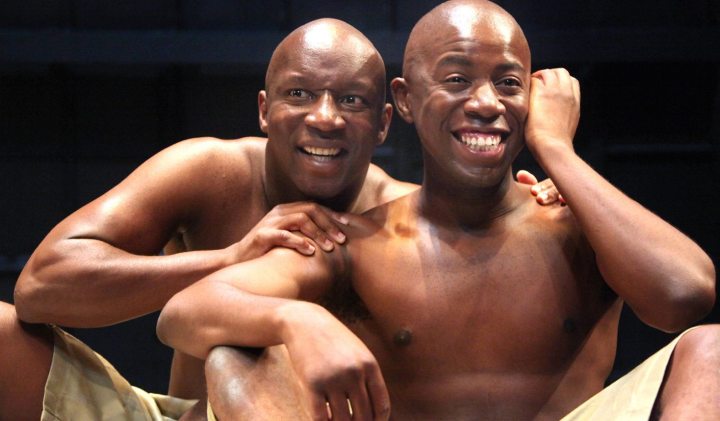Maverick Life
Review: Exposing the scars of Apartheid at the Market Theatre

The Market Theatre has jumped straight into confrontational theatre this year, opening with two plays that scrape at the festering wounds inflicted by Apartheid. By LESLEY STONES.
That sounds heavy stuff, and it is, with both The Island and Mies Julie proving provocative and challenging rather than outright enjoyable.
The Island has been around forever, first performed in 1973, and was written in a then-illegal collaboration between Athol Fugard, John Kani and Winston Ntshona.
It’s the story of two Robben Island cellmates, John and Winston, who are rehearsing a performance of Sophocles’ Antigone. By presenting a play-within-a-play, the authors cleverly use an ancient fight against political repression to highlight the gross inequalities and brutality of Apartheid.
Actors Atandwa Kani as John and Nat Ramabulana as Winston weren’t even born when The Island was written, yet they capture the backbreaking manual work perfectly and the tedium of hours of confinement with nothing to do but tell stories and bicker like an old married couple.
Kani, the son of the renowned author and actor John, has his father’s nuances of speech and is gaining his gravitas too. Both he and Ramabulana give powerful performances, equally matched in skills, eloquence and ability to capture the tension, boredom, hope and fears of their characters.

When John hears of his impending freedom, he feels guilty about abandoning his short-tempered friend, and Winston lets rip through jealousy, knowing many cellmates will come and go while he faces a bleak future of nothing but rocks and desolation.
My only gripe was the length of the opening sequence of mimed rock-breaking, which set the scene but overran its purpose considerably, creating a shuffling audience rather than one captivated by anticipation of the main event.
Also running at The Market is the much-acclaimed Mies Julie, rewritten to be set 18 years after the supposed arrival of democracy. The story is based on a Swedish play of 1888, but now unfolds in the Karoo in this version reworked and directed by Yael Farber.
When Mies Julie was performed in South Africa in 1985, it sparked death threats because of a cross-colour kiss. The kiss has now become a full-on highly graphic sex scene, so vigorous that the poor kitchen table may not make it through the season.

The play raises the vast inequalities and different expectations and realities the legacy of Apartheid has created for people with different colour skins. The white Boer and his daughter hold the land that was stolen by their ancestors, while squatters are ganging up outside with potent fury.
Skittish and sluttish Mies Julie (Hilda Cronje) goads her childhood playmate John (Bongile Mantsai) who is now the farmhand, taunting him beyond his limit with belittling insults and teasing him with her sexuality. The cultures forced upon them mean John can never be her equal, even though they were both raised by his mother Christine (Thoko Ntshinga).
John and Julie don’t know if they love or hate each other, and swing wildly from violence to tenderness as they explore the past, future possibilities and practical constraints.
The play throws myriad emotions into a ferocious cocktail of social complexities still festering in this post-traumatic society. The set and lighting by Patrick Curtis capture the atmosphere perfectly, while the music by Daniel and Matthew Pencer creates an ever-present and often jarring background that highlights the disturbed nature of the characters and their actions.

Mies Julie has won awards and widespread acclaim, and the production is well acted and engrossing. Yet it’s not an easy watch. I was intrigued, rather than engaged, with the sense that it was all too melodramatic, too extreme in its emotions and physicality. It also felt outdated, and such clear-cut ideas of what is acceptable and what is forbidden would be more convincing if it were set a few years ago.
The play closes with John taking up arms in emulation of his weapon-wielding master, implying that the young are little better than the old, and brutality inflicted on one generation is bound to be continued through the next.
If that is true, then we haven’t progressed one jot since the days of The Island. DM
* The Island runs until March 24, and Mies Julie runs until February 24, both at The Market Theatre.
Book through Computicket on 0861 915 8000 or www.computicket.co.za.
















 Become an Insider
Become an Insider